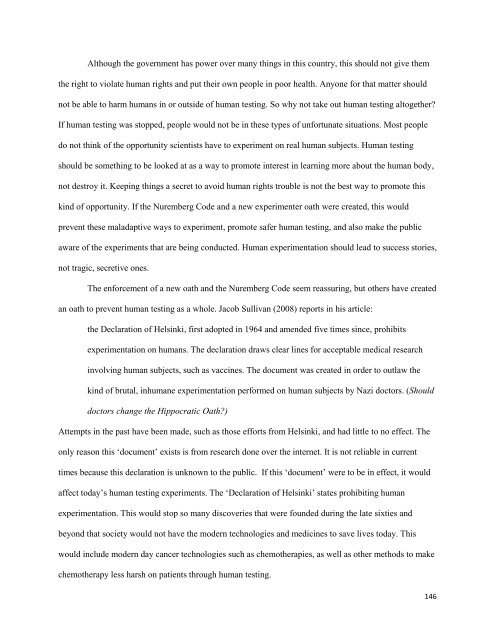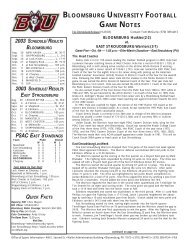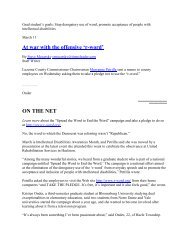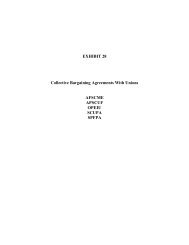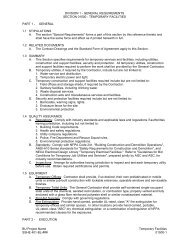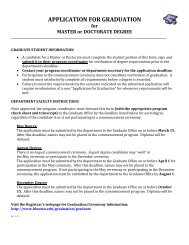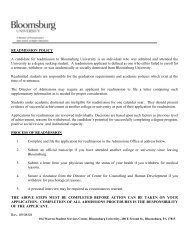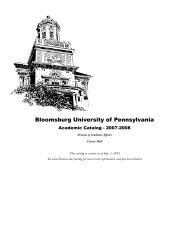Human Rights at Home and Abroad: Past, Present, and Future
Human Rights at Home and Abroad: Past, Present, and Future
Human Rights at Home and Abroad: Past, Present, and Future
Create successful ePaper yourself
Turn your PDF publications into a flip-book with our unique Google optimized e-Paper software.
Although the government has power over many things in this country, this should not give them<br />
the right to viol<strong>at</strong>e human rights <strong>and</strong> put their own people in poor health. Anyone for th<strong>at</strong> m<strong>at</strong>ter should<br />
not be able to harm humans in or outside of human testing. So why not take out human testing altogether?<br />
If human testing was stopped, people would not be in these types of unfortun<strong>at</strong>e situ<strong>at</strong>ions. Most people<br />
do not think of the opportunity scientists have to experiment on real human subjects. <strong>Human</strong> testing<br />
should be something to be looked <strong>at</strong> as a way to promote interest in learning more about the human body,<br />
not destroy it. Keeping things a secret to avoid human rights trouble is not the best way to promote this<br />
kind of opportunity. If the Nuremberg Code <strong>and</strong> a new experimenter o<strong>at</strong>h were cre<strong>at</strong>ed, this would<br />
prevent these maladaptive ways to experiment, promote safer human testing, <strong>and</strong> also make the public<br />
aware of the experiments th<strong>at</strong> are being conducted. <strong>Human</strong> experiment<strong>at</strong>ion should lead to success stories,<br />
not tragic, secretive ones.<br />
The enforcement of a new o<strong>at</strong>h <strong>and</strong> the Nuremberg Code seem reassuring, but others have cre<strong>at</strong>ed<br />
an o<strong>at</strong>h to prevent human testing as a whole. Jacob Sullivan (2008) reports in his article:<br />
the Declar<strong>at</strong>ion of Helsinki, first adopted in 1964 <strong>and</strong> amended five times since, prohibits<br />
experiment<strong>at</strong>ion on humans. The declar<strong>at</strong>ion draws clear lines for acceptable medical research<br />
involving human subjects, such as vaccines. The document was cre<strong>at</strong>ed in order to outlaw the<br />
kind of brutal, inhumane experiment<strong>at</strong>ion performed on human subjects by Nazi doctors. (Should<br />
doctors change the Hippocr<strong>at</strong>ic O<strong>at</strong>h?)<br />
Attempts in the past have been made, such as those efforts from Helsinki, <strong>and</strong> had little to no effect. The<br />
only reason this ‗document‘ exists is from research done over the internet. It is not reliable in current<br />
times because this declar<strong>at</strong>ion is unknown to the public. If this ‗document‘ were to be in effect, it would<br />
affect today‘s human testing experiments. The ‗Declar<strong>at</strong>ion of Helsinki‘ st<strong>at</strong>es prohibiting human<br />
experiment<strong>at</strong>ion. This would stop so many discoveries th<strong>at</strong> were founded during the l<strong>at</strong>e sixties <strong>and</strong><br />
beyond th<strong>at</strong> society would not have the modern technologies <strong>and</strong> medicines to save lives today. This<br />
would include modern day cancer technologies such as chemotherapies, as well as other methods to make<br />
chemotherapy less harsh on p<strong>at</strong>ients through human testing.<br />
146


